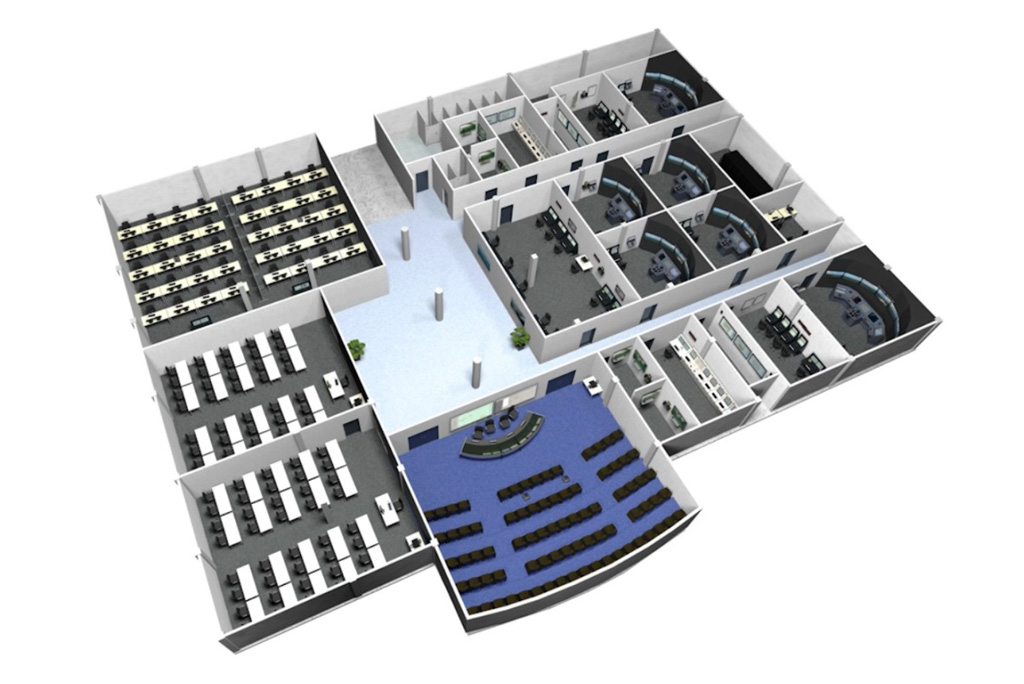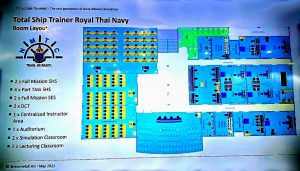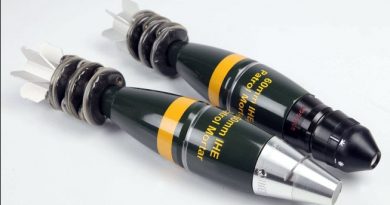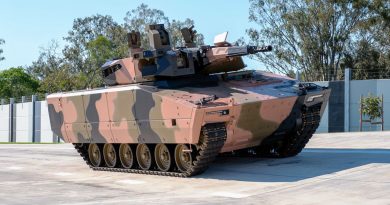
IMDEX 2023 – Rheinmetall details its Total Ship Trainer applied solution
At the IMDEX Asia trade fair in Singapore, Rheinmetall unveiled its ‘Total Ship Trainer’, a fully networked and integrated solution for the realistic land-based training of an entire crew ship, which will be delivered to the Thailand Navy next August after the final acceptance activities that will be completed in July.
For reliable naval operation planning, it is essential to have a suitable platform, a full crew and the confidence that both are well prepared before they are sent on combat missions. But resources are scarce, ships are needed for operations, and crew need rest and recovery periods ashore.
Mission and manning concepts for modern and complex surface combatants require a new and innovative approach for operational preparation. The challenge is to establish a holistic crew training under real-world conditions in a synthetic reality. A new generation of naval simulators offers an interdependent crew training in a fully integrated simulation environment.
Based on its long-lasting experience in naval simulation, Rheinmetall developed a Total Ship Training System meeting these objectives. The latter concept integrates different team trainers to full mission training, taking main tasks on board a common warship into account. Accordingly, the following areas of action are represented: Bridge, Combat Information Center, Engineering Control Station, Battle Damage Station and Virtual Ship for local operations.

All these areas were normally trained in separated training stations and simply adding a networking infrastructure fed with the same scenario doesn’t generate, according to Rheinmetall, a total ship training system. For a whole crew training, the areas of navigation, platform and damage control must be integrated into one consistent simulation environment to form the basis for interdependent scenarios. Within Rheinmetall’s Total Ship Training System concept, this is based on dedicated simulation systems with deep interfaces to a joint simulation network and the Joint Exercise Control.
In July 2021, Rheinmetall Electronics from Bremen was awarded the contract to build the Royal Thailand’s Naval Mission Training Center (NMTC). Rheinmetall is not only supplying the simulators but is also responsible for the construction of the two-floor training building at the naval base in Sattahip, Thailand. The project also includes interconnection with other Royal Thai Navy facilities and the training of teaching staff.
The two-floor NMTC includes 20 simulator systems in “full-mission” and “part-task” configurations, all managed by a centralized instructor area, as well as four associated classroom trainers and a briefing/debriefing auditorium. One of the two floors of the new building accommodates all the simulators mentioned above, which are networked among them so that all relevant teams of a complete ship’s crew can be trained with each other simultaneously. Responsible for this extremely high simulation performance is a novel server system based on virtualized high-performance servers.
Another key feature is that each of the in-service or to be introduced into service ship have their own combat management system and ship bridge together with ship management system, propulsion and damage control suites. Rheinmetall developed the capability to replicate these different systems through their emulation, employing software and display representation running on common hardware.
The NMTC features all and fully emulated ship centers (bridge, combat information center, engineering control and damage control) for two ships while four part-task trainers allow to replicate ship bridges. In total, the NMTC can fully train the entire crew of two ships of different classes in different operational scenarios and up to six ships working together using part task trainers. In particular, operational procedures and communication methods can be trained and optimized in a wide variety of internal and external naval warfare scenarios. This makes the previous individual crew training much more realistic and comprehensive, so that the entire crew is better prepared for combat readiness at sea.
These activities are all managed by a centralized instructor area while training activities can be followed in real or deferred time in the briefing/debriefing area, allowing the same or other personnel to learn from their mistakes, or from lessons learned by other personnel, to improve both training and proficiency.
In addition to the system integration, also the Thai naval instructors training took place in Germany from October 2022 and was successfully completed on all individual simulators of the Total Ship Trainer configuration and on the server system in January 2023. Subsequently, the training system was again optimized with regard to the customer’s user requirements.
In mid-April the entire system was loaded on a sea transport heading to the Sattahip naval base, where system integration was launched, and acceptance procedures will begin in the completed training building. Final acceptance by the customer is scheduled for July 2023 with official delivery planned for August.
Photo and graphics courtesy L. Peruzzi and Rheinmetall


